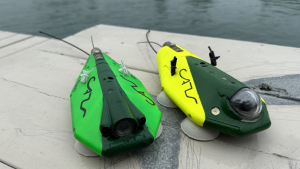
To help protect and understand Hawaiʻi’s whale populations, marine mammal researchers at the University of Hawaiʻi at Mānoa and Pacific Whale Foundation are utilizing cutting-edge non-invasive suction-cup tags to track endangered false killer whales and short-finned pilot whales. The CATS (Customized Animal Tracking Solutions) tags, equipped with cameras, hydrophones, accelerometers and depth sensors, provide insights into the daily lives of these marine species.
Lars Bejder, Jens Currie and their team have been deploying CATS tags, which were originally used on larger species such as humpback whales, and have evolved to cater to the specific needs of smaller species such as pilot whales and false killer whales. The tag is a non-invasive tool that separates from the whale when air is released into the suction cups.

“We started using these tags on smaller animals, which we haven’t done before,” said Bejder, director of the UH Marine Mammal Research Program (MMRP). “That has opened up new windows to different species that we haven’t focused on before. Part of that has been the development of the next iteration of tags, which are meant for deep diving cetaceans. These tags are currently one-of-a-kind as far as we know.”
The deployment of CATS tags on these whales enables scientists to track their movements, diving patterns, and even record the sounds of their underwater environment. The tags are designed for deep-diving cetaceans, capable of withstanding pressures at depths of up to 1,000 meters. This allows researchers to explore the behaviors of pilot whales and false killer whales, shedding light on the impacts of human activities and the threats it could pose to Hawaiʻi’s endangered false killer whale population. Understanding how false killer whales interact with prey can help inform the fishing industry on optimizing gear to reduce unintended interactions.
“The Main Hawaiian Islands Insular false killer whale is an endangered population here in Hawaiʻi,” said Currie, a PhD student in MMRP and director of Pacific Whale Foundation’s research. “There are only about 130 animals left in the population based on the latest estimate. It’s an important population to be studying and we can gain some impactful insights for conservation and management measures for false killer whales using these tags.”
Bejder and Currie emphasized the important role the public plays in spotting these marine mammals. To report sightings of false killer whales, call the NOAA Fisheries Hotline at (888) 256-9840, option 5. All research is being conducted under federal permits and IACUC approvals.

